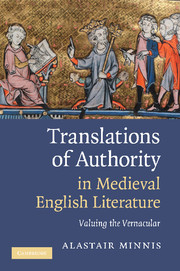Book contents
- Frontmatter
- Contents
- Preface
- List of abbreviations
- Introduction: valuing the vernacular
- Chapter 1 Absent glosses: the trouble with Middle English hermeneutics
- Chapter 2 Looking for a sign: the quest for Nominalism in Ricardian poetry
- Chapter 3 Piers's protean pardon: Langland on the letter and spirit of indulgences
- Chapter 4 Making bodies: confection and conception in Walter Brut's vernacular theology
- Chapter 5 Spiritualizing marriage: Margery Kempe's allegories of female authority
- Chapter 6 Chaucer and the relics of vernacular religion
- Notes
- Bibliography
- Index
Chapter 1 - Absent glosses: the trouble with Middle English hermeneutics
Published online by Cambridge University Press: 30 June 2009
- Frontmatter
- Contents
- Preface
- List of abbreviations
- Introduction: valuing the vernacular
- Chapter 1 Absent glosses: the trouble with Middle English hermeneutics
- Chapter 2 Looking for a sign: the quest for Nominalism in Ricardian poetry
- Chapter 3 Piers's protean pardon: Langland on the letter and spirit of indulgences
- Chapter 4 Making bodies: confection and conception in Walter Brut's vernacular theology
- Chapter 5 Spiritualizing marriage: Margery Kempe's allegories of female authority
- Chapter 6 Chaucer and the relics of vernacular religion
- Notes
- Bibliography
- Index
Summary
During the period 1479–82 the massive Cancionero da Barrantes was produced, containing works by three of the greatest Spanish poets of the fifteenth century, Santillana, Juan de Mena, and Pérez de Guzmán, accompanied by extensive commentary in Castilian and Latin. Modern scholars of Middle English literature would give much for an English counterpart. Why does such a thing not exist; where have all the English (or indeed Latin) glosses on English texts gone? To be more precise, why were they not written?
Admittedly, occasional glosses may be found in certain manuscripts of Geoffrey Chaucer's works, particularly the Canterbury Tales, and the sporadic Latin commentary which John Gower himself seems to have provided for his English Confessio amantis has received at least some of the attention which it deserves. ‘An elaborate Latin commentary’ on the single most popular poem in Middle English, The Pricke of Conscience (which survives in well over a hundred manuscripts), has been reported. However, this turns out to comprise nothing more than interpolated passages of Latin; we are dealing with amplificatio and re-compilation rather than formal commentary on a ‘hermeneutically sealed’ textual unit. The mid-fifteenth-century Court of Sapience does include an extensive apparatus of Latin source-references (unfortunately omitted in the latest edition of the work), but there is none of the explication de texte which medieval commentary characteristically provides.
- Type
- Chapter
- Information
- Translations of Authority in Medieval English LiteratureValuing the Vernacular, pp. 17 - 37Publisher: Cambridge University PressPrint publication year: 2009

